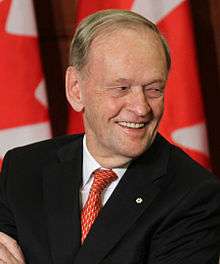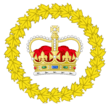37th Canadian Parliament
| 37th Parliament of Canada | |||
|---|---|---|---|
| Majority parliament | |||
| January 29, 2001 – May 23, 2004 | |||
| Parliament leaders | |||
| Prime Minister (cabinet) |
Rt. Hon. Jean Chrétien (26th Canadian Ministry) November 4, 1993 – December 12, 2003 | ||
|
Rt. Hon. Paul Martin (27th Canadian Ministry) December 12, 2003 – February 6, 2006 | |||
| Leader of the Opposition |
Hon. Stockwell Day September 11, 2000 – December 11, 2001 | ||
|
Hon. John Reynolds (acting) December 12, 2001 – May 20, 2002 | |||
|
Hon. Stephen Harper May 21, 2002 – January 8, 2004 | |||
|
Hon. Grant Hill (acting until February 1, 2004) January 9, 2004 – March 19, 2004 | |||
|
Hon. Stephen Harper March 20, 2004 – February 6, 2006 | |||
| Party caucuses | |||
| Government | Liberal Party | ||
| Opposition | Canadian Alliance* | ||
| Third parties | Bloc Québécois | ||
| New Democratic Party | |||
| Progressive Conservative* | |||
| * Parties merged together partway through the Parliament to create the Conservative Party of Canada. | |||
| House of Commons | |||
|
Seating arrangements of the House of Commons | |||
| Speaker of the Commons |
Hon. Peter Milliken January 29, 2001 – June 2, 2011 | ||
| Members |
301 seats MP seats List of members | ||
| Senators |
105 seats senator seats List of senators | ||
| Sessions | |||
|
1st Session January 29, 2001 – September 16, 2002 | |||
|
2nd Session September 30, 2002 – November 12, 2003 | |||
|
3rd Session February 2, 2004 – May 23, 2004 | |||
| |||

The 37th Canadian Parliament was in session from January 29, 2001, until May 23, 2004. The membership was set by the 2000 federal election on November 27, 2000, and it changed only somewhat due to resignations and by-elections until it was dissolved prior to the 2004 election.
It was controlled by a Liberal Party majority, led first by Prime Minister Jean Chrétien and the 26th Canadian Ministry, and then by Prime Minister Paul Martin and the 27th Canadian Ministry. The Official Opposition was formed by first the Canadian Alliance, led by Stockwell Day and then by Stephen Harper, and then by its successor party, the Conservative Party, also led by Harper.
The Speaker was Peter Milliken. See also list of Canadian electoral districts 1996-2003 for a list of the ridings in this parliament.
There were three sessions of the 37th Parliament:
| Session | Start | End |
|---|---|---|
| 1st | January 29, 2001 | September 16, 2002 |
| 2nd | September 30, 2002 | November 12, 2003 |
| 3rd | February 2, 2004 | May 23, 2004 |
Party standings
 |
| This article is part of a series on the politics and government of Canada |
| Government |
|
|
Related topics |
The party standings as of the election and as of dissolution were as follows:
| Affiliation | House Members | Senate Members | |||
|---|---|---|---|---|---|
| 2000 Election Results |
At Dissolution | On Election Day 2000[1] |
At Dissolution | ||
| Liberal Party of Canada | 172 | 168 | 55 | 65 | |
| Alliance | 66 | N/A | 1 | N/A | |
| Bloc Québécois | 38 | 33 | 0 | 0 | |
| New Democratic Party | 13 | 14 | 0 | 0 | |
| Progressive Conservative | 12 | N/A | 35 | N/A | |
| Conservative Party of Canada | N/A | 72 | N/A | 24 | |
| Independent | 0 | 10 | 5 | 5 | |
| Senate Progressive Conservative Caucus | N/A | 0 | N/A | 3 | |
| Total members | 301 | 297 | 96 | 97 | |
| Vacant | 0 | 4 | 9 | 8 | |
| Total seats | 301 | 105 | |||
Bills
Important bills of the 37th parliament include:
- Assisted Human Reproduction Act
- Canadian federal budget, 2001
- Canadian federal budget, 2003
- Canadian federal budget, 2004
- Bill C-250, declared attacks based on sexual orientation to be hate crimes.
- Immigration and Refugee Protection Act
- Youth Criminal Justice Act
- Pledge to Africa Act
Members
- For full lists of members of the 37th Parliament of Canada, see List of House members of the 37th Parliament of Canada and List of senators in the 37th Parliament of Canada.
By-elections
References
- ↑ Members of the Canadian Senate are appointed by the Governor General on the advice of the Prime Minister and remain as Senators until the age of 75, even if the House of Commons has been dissolved or an election has been called.
- Government of Canada. "26th Ministry". Guide to Canadian Ministries since Confederation. Privy Council Office. Retrieved 2006-11-09.
- Government of Canada. "27th Ministry". Library of Parliament. Retrieved 2006-12-01.
- Government of Canada. "37th Parliament". Members of the House of Commons: 1867 to Date: By Parliament. Library of Parliament. Retrieved 2006-11-30.
- Government of Canada. "Duration of Sessions". Library of Parliament. Retrieved 2006-05-12.
- Government of Canada. "General Elections". Library of Parliament. Archived from the original on 2006-05-04. Retrieved 2006-05-12.
- Government of Canada. "Key Dates for each Parliament". Library of Parliament. Archived from the original on 2005-09-14. Retrieved 2006-05-12.
- Government of Canada. "Leaders of the Opposition in the House of Commons". Library of Parliament. Archived from the original on 2007-03-11. Retrieved 2006-05-12.
- Government of Canada. "Party Standings (1974 to date): At the Senate". Library of Parliament. Retrieved 2007-04-24.
- Government of Canada. "Prime Ministers of Canada". Library of Parliament. Archived from the original on 27 April 2006. Retrieved 2006-05-12.
- Government of Canada. "Speakers". Library of Parliament. Archived from the original on 2006-09-17. Retrieved 2006-05-12.